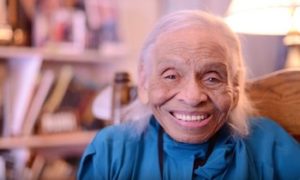
Olivia Hooker
*Olivia Hooker was born on this date in 1915. She was a Black psychologist and professor.
Olivia J. Hooker was born in Muskogee, Oklahoma. At the age of six, during the Tulsa Race Riots of 1921, Ku Klux Klan members ransacked her home while she hid under a table with her three siblings. Hooker later was a founder of the Tulsa Race Riot Commission in hopes of demanding reparations for the riot's survivors. In 2003, she was among the riot survivors to file an unsuccessful federal lawsuit seeking reparations.
After the riots, Hooker's family moved to Columbus, Ohio, where she earned her Bachelor of Arts in 1937 from Ohio State University. While at OSU, she joined the Delta Sigma Theta sorority, where she advocated for black women to be admitted to the navy. Ten years later, in 1947, she received her Master's from the Teachers College of Columbia University. In 1961, Hooker received her Ph.D. in psychology from the University of Rochester. Hooker applied to the Women Accepted for Volunteer Emergency Service (WAVES) of the U.S. Navy but was rejected because she was black. She disputed the rejection due to a technicality and was accepted but had already decided to join the Coast Guard.
She entered the U.S. Coast Guard in February 1945 and underwent basic training for six weeks in Manhattan Beach, Brooklyn, New York. She was one of only five black women in the SPAR program. After basic training, Hooker specialized in the yeoman rate and remained at boot camp for an additional nine weeks before heading to Boston. Here, she performed administrative duties and earned the rank of Yeoman Second Class in the Coast Guard Women's Reserve. In June 1946, the SPAR program was disbanded, and she earned the rank of petty officer 2nd class and a Good Conduct Award. After receiving her master’s degree, she moved upstate to work in the mental hygiene department of a women's correctional facility in Albion. Many women in this facility were considered to have severe learning disabilities. Hooker felt they were more capable than given credit and re-evaluated them and helped the women to pursue better education and jobs. She credited this success with "approaching them with an open mind."
In 1963, she joined Fordham University as a senior clinical lecturer; eventually, she served as an associate professor until 1985. Hooker was one of the founders of the American Psychological Association's (APA) Division 33, Intellectual and Developmental Disabilities. She also served as an early director of the Kennedy Child Study Center in New York City. Hooker retired at the age of 87. She joined the Coast Guard Auxiliary at age 95 and volunteered in Yonkers, New York.
The last known survivor of the Tulsa Race Riots of 1921, she received the American Psychological Association Presidential Citation in 2011. In 2012, she was inducted into the New York State Senate Veterans' Hall of Fame. In 2015, Kirsten Gillibrand spoke in Congress to "pay tribute" to Hooker. The same year, the Olivia Hooker Dining Facility on the Staten Island coast guard facility was named in her honor. A training facility at the Coast Guard's headquarters in Washington, D.C., was named after her. Also, in 2015, President Barack Obama recognized Hooker's Coast Guard service and legacy while attending the 134th Commencement of the United States Coast Guard Academy.
On November 11, 2018, Google honored her by telling her story as part of a Google Doodle for the Veterans Day holiday. On November 21, 2018, Hooker died of natural causes in her home in White Plains, New York, at the age of 103.